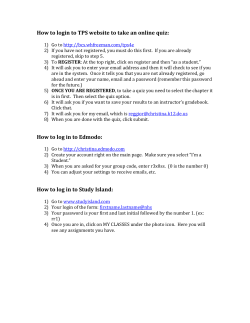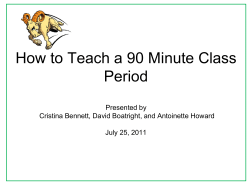
THE UNIVERSITY OF WESTERN ONTARIO Department of Psychology
THE UNIVERSITY OF WESTERN ONTARIO LONDON CANADA Department of Psychology 2014-2015 Psychology 2115B, Section#001 Introduction to Sensation and Perception 1.0 CALENDAR DESCRIPTION An introduction to the study of the human senses and higher order perceptual processes. Data gathered from psychophysical research and studies of the nervous system in both humans and other animals will be discussed. The course will review the mechanisms and principles of operation of vision, hearing, touch, taste and smell. Antirequisites: Psychology 2015A/B Prerequisite: At least 60% in a 1000 level Psychology course 4 lecture hours, 0.5 course Unless you have either the requisites for this course or written special permission from your Dean to enroll in it, you may be removed from this course and it will be deleted from your record. This decision may not be appealed. You will receive no adjustment to your fees in the event that you are dropped from a course for failing to have the necessary prerequisites. 2.0 COURSE INFORMATION Instructor: Office: Phone Number: E-mail: Office Hours: Course Coordinator: Dr. Stephen G. Lomber SSC 9214 519-663-5777 x24110 steve.lomber@uwo.ca after class or by appointment Dr. Stephen G. Lomber Teaching Assistant: Office: E-mail: Office Hours: Chao Gu EB-12, RRI cgu23@uwo.ca after class or by appointment Time and Location of Lectures: Tuesday and Thursday 8:30-10:15 AM Social Science Centre, Rm 2024 3.0 TEXTBOOKS Required: Sensation and Perception (Ninth Edition), 2014 By E. Bruce Goldstein Wadsworth Cengage Learning Optional: 1 Sensory Exotica By Howard C. Hughes MIT Press, 1999 4.0 COURSE OBJECTIVES The world is an external environment, yet our experience of the world occurs within our brains. How do our senses transform the external world into information that our brains/minds can understand and reliably interpret? For instance, how does the light emitted off an object allow us to perceive and identify that object? How do sound, smell, taste, and touch allow us to create a rich and detailed mental representation of the external world? To answer these questions we will examine perceptual processes at a number of different levels. At the neurological level we will investigate how individual cells respond to external stimuli, how the anatomy and physiology of the perceptual systems allow for efficient processing of incoming information, and how different brain areas are specialized for the analysis of specific types of sensory information. At a behavioral level we will investigate illusions and subjective experiences. A careful examination of these experiences reveals the processes underlying perception and the type of information used by the brain. By investigating these types of errors we hope to learn more about the way the brain actively recreates the world. Goals: Learn the structure and function of our sensory systems. Learn how our brain compresses and analyzes incoming information Learn how to design and develop good experiments to investigate sensation Learn the beauty and sophistication of our neurological systems 5.0 EVALUATION Exams (80%): There will be two exams during the course. Each exam will be worth 40% of your final grade and will cover the material from the half of the course preceding the exam. There will be no cumulative final exam. Material covered on the exams will be taken from the assigned readings and class lectures, as well as any additional material that may be provided. Exams may include multiple choice, matching, or true/false questions. Quizzes (20%): During the course of the semester, six quizzes will be given. Quiz dates are provided on the lecture schedule. A quiz will only cover material presented in the three lectures prior to the quiz. Each quiz will be given at the beginning of class and will consist of ten questions (multiple choice and true/false). Your lowest quiz grade will be dropped and the remaining 5 quizzes will be used to calculate your overall quiz grade. As one quiz grade will be dropped, no make-ups are provided for a missed quiz. Missed Exams: Missed exams may be made up only if you: 1) have a valid excuse, and 2) notified Dr. Lomber BEFORE the exam. Excuses must be accompanied by valid documentation (documentation that you sought medical assistance, a newspaper clipping of the obituary of your dead relative, photographs of you with the space aliens that conveniently abducted you the evening before the exam). The Psychology Department follows the University of Western Ontario grading guidelines, which are as follows (see http://www.uwo.ca/univsec/handbook/general/grades_undergrad.pdf): A+ 90-100 One could scarcely expect better from a student at this level A 80-89 Superior work that is clearly above average B 70-79 Good work, meeting all requirements, and eminently satisfactory C 60-69 Competent work, meeting requirements D 50-59 Fair work, minimally acceptable F below 50 Fail 2 6.0 TEST AND EXAMINATION SCHEDULE Exam 1 – February 12th, 8:30AM, Social Science Centre, Rm 2024 Exam 2 – Date and Location to be determined 7.0 2015 LECTURE SCHEDULE LECTURE AND READING SCHEDULE Date Lecture Lecture Topic Reading January 6 1 Course Introduction and Fundamentals of Perception Chapter 1 January 8 2 Neurons and Membranes Chapter 2 January 13 3 The Action Potential Chapter 2 January 15 4 Synaptic Transmission and Integration Chapter 2 January 20 5 Introduction to Vision (Quiz) Chapter 3 January 22 6 Eye and Retina Chapter 3 January 27 7 Visual Pathways and Primary Visual Cortex Chapter 4 January 29 8 Visual Cortex and Beyond (Quiz) Chapter 4 February 3 9 Object Perception Chapter 5 February 5 10 Visual Attention and The Binding Problem Chapter 6 February 10 11 Perception and Action (Quiz) Chapter 7 February 12 Exam 1 (Lectures 1-11, Chapters 1-7) February 17 Reading Week – No Class February 19 Reading Week – No Class February 24 No Class February 26 12 Motion Perception Chapter 8 March 3 13 Color Perception Chapter 9 March 5 14 Depth Perception Chapter 10 March 10 15 Hearing (Quiz) Chapter 11 March 12 16 Hearing and Balance Chapter 11 March 17 17 Sound Localization Chapter 12 March 19 18 Speech Perception and Language (Quiz) Chapter 13 March 24 19 Touch Chapter 14 March 26 20 Touch and Pain Chapter 14 March 31 21 Smell and Taste Chapter 15 April 2 22 Perceptual Development (Quiz) Chapter 16 April 7 23 Multisensory Integration and Crossmodal Plasticity TBD Exam 2 (Lectures 12-23, Chapters 8-16) 3 8.0 STATEMENT ON ACADEMIC OFFENCES Students are responsible for understanding the nature and avoiding the occurrence of plagiarism and other scholastic offenses. Plagiarism and cheating are considered very serious offenses because they undermine the integrity of research and education. Actions constituting a scholastic offense are described at the following link: http://www.uwo.ca/univsec/handbook/appeals/scholoff.pdf As of Sept. 1, 2009, the Department of Psychology will take the following steps to detect scholastic offenses. All multiple-choice tests and exams will be checked for similarities in the pattern of responses using reliable software, and records will be made of student seating locations in all tests and exams. Possible penalties for a scholastic offense include failure of the assignment, failure of the course, suspension from the University, and expulsion from the University. 9.0 OTHER INFORMATION OWL: A copy of the syllabus and other important information will be posted on OWL. At least 48 hours prior to each lecture, an outline of the lecture will be posted and available for downloading and printing. These outlines will accumulate until the next exam, when they will be removed. Attendance and Readings: Your performance in this course will be greatly influenced by your attendance. Some material discussed in lecture is not covered in the textbook. Cell Phones, etc.: Cell phones, pagers, iPods, and other electronic devices, except laptops, have no place in class. Please do not bring them to class or turn them off. Any ringing cell phones will be answered by Dr. Lomber. Office of the Registrar web site: http://www4.registrar.uwo.ca Student Development Services web site: http://www.sdc.uwo.ca Please see the Psychology Undergraduate web site for information on the following: http://psychology.uwo.ca/newundergradstudentresp.htm - Policy on Cheating and Academic Misconduct - Procedures for Appealing Academic Evaluations - Policy on Attendance - Policy Regarding Makeup Exams and Extensions of Deadlines - Policy for Assignments - Short Absences - Extended Absences - Documentation - Academic Concerns - 2009 Calendar References No electronic devices, including cell phones, will be allowed during exams. 4
© Copyright 2025














